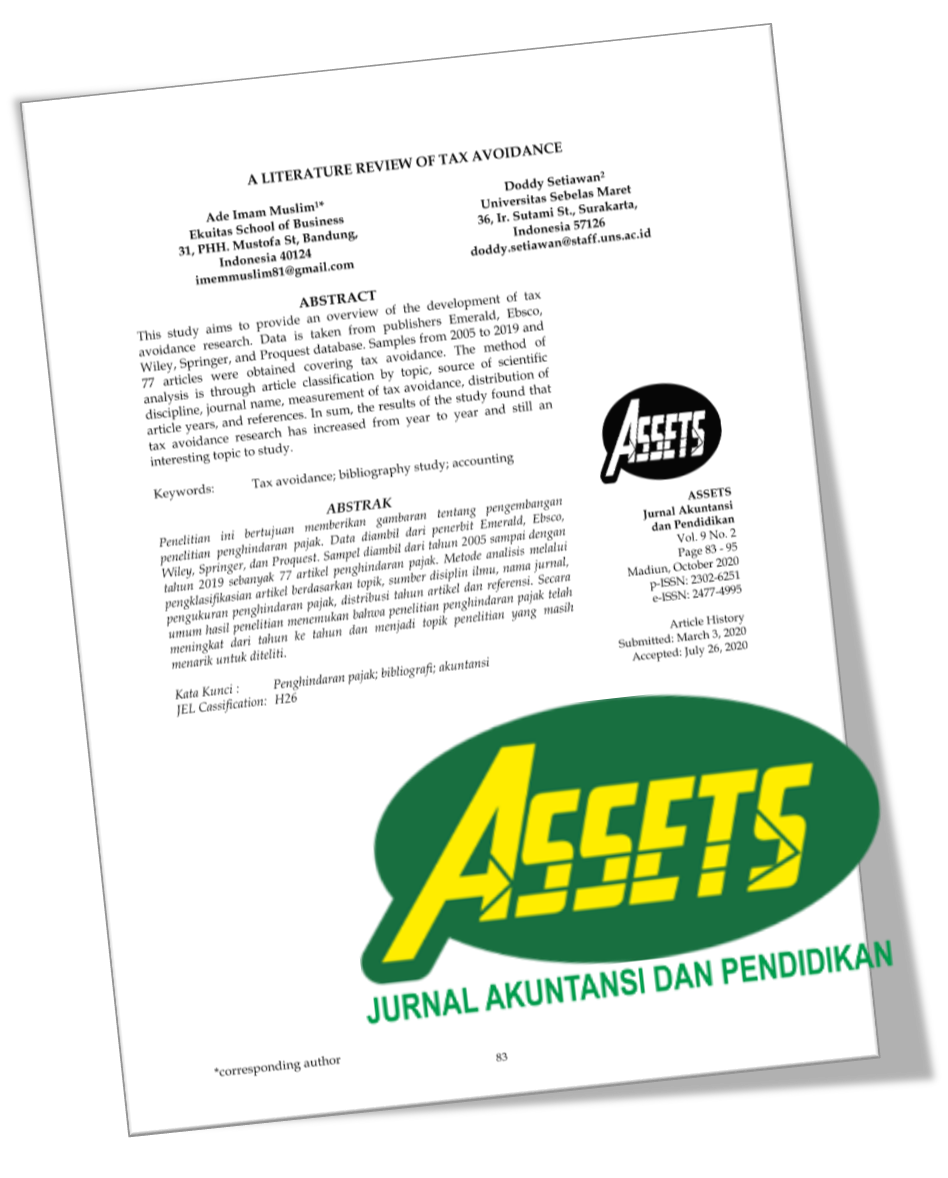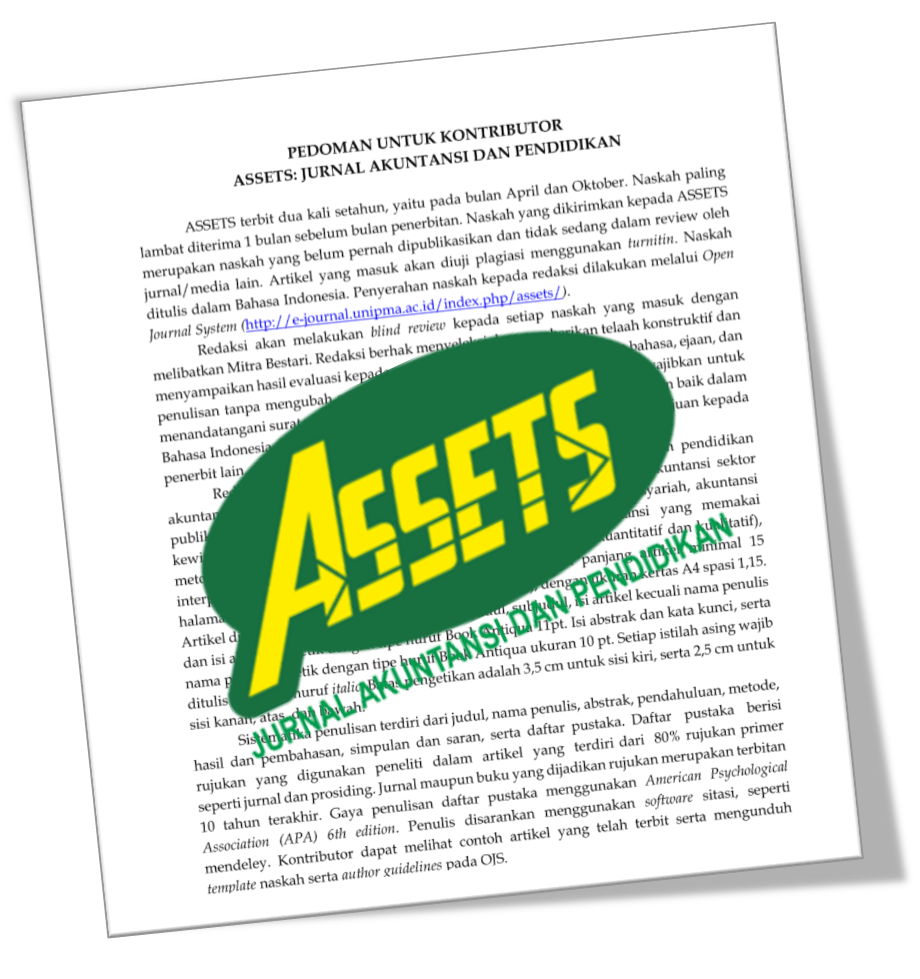THE EMBODIMENT OF VOLUNTARY COMPLIANCE THROUGH UNDERSTANDING OF MSMEs TAX COMPLIANCE PERCEPTION
DOI:
https://doi.org/10.25273/jap.v10i1.7129Keywords:
Tax Compliance, Voluntary Tax Compliance, Taxpayers Perception, MSMEs, Kepatuhan Pajak, Kepatuhan Sukarela, Persepsi Wajib Pajak, WP UMKMAbstract
ABSTRACT
This research aims to understand micro, small and medium-sized enterprises' (MSMEs) perception of tax compliance as an embodiment of voluntary compliance. This study uses a qualitative interpretive method. The results show the fulfillment of MSMEs taxation is affected by the application of fines/sanctions, tax audits, tax knowledge, tax education, trust in tax authorities, a fair tax system, social norms, and ease of tax administration. These factors internalize into a value in the self of MSMEs, which is reflected through behavioral compliance. The shaping of positive tax perception is capital to realize tax awareness. The study results contribute to the realization of MSMEs compliance, both tax authorities and MSMEs.
ABSTRAK
Penelitian ini bertujuan untuk memahami persepsi wajib pajak usaha mikro kecil menengah (WP UMKM) tentang kepatuhan pajak sebagai bentuk perwujudan kepatuhan sukarela. Penelitian ini menggunakan metode interpretif kualitatif. Hasil penelitian menunjukkan bahwa pemenuhan kewajiban perpajakan WP UMKM dipengaruhi oleh penerapan denda/sanksi, pemeriksaan pajak, pengetahuan perpajakan, edukasi, kepercayaan terhadap otoritas pajak, sistem pajak yang adil, nilai sosial, dan kemudahan administrasi perpajakan. Faktor-faktor ini diinternalisasi menjadi sebuah nilai dalam diri WP UMKM yang kemudian tercermin melalui perilaku kepatuhannya. Pembentukan persepsi pajak yang positif merupakan modal untuk mewujudkan kesadaran pajak. Hasil penelitian berkontribusi terhadap perwujudan kepatuhan baik otoritas pajak maupun WP UMKM.
Downloads
References
Acheampong, O., Debrah, O., & Yeboah, I. O. (2016). An Assessment of Tax Compliance Level of Small Enterprises in Ghana. European Journal of Business and Management, 8(12), 81–89.
Akinboade, O. A. (2015). Correlates of Tax Compliance of Small and Medium Size Businesses in Cameroon. Managing Global Transitions, 13(41), 389–413.
Ameyaw, B., Korang, J., Twum, E., & Asante, I. (2016). Tax Policy, SMEs Compliance, Perception and Growth Relationship in Ghana: An Empirical Analysis. British Journal of Economics, Management & Trade, 11, 1–11.
Aneswari, Y. R., Darmayasa, I. N., & Yusdita, E. E. (2015). Perspektif Kritis Penerapan Pajak Penghasilan 1% Pada UMKM. Simposium Nasional Perpajakan (SNP) 5 Universitas Trunojoyo Madura, 12 November 2015. Madura: Universitas Trunojoyo, 12 Nopember 2015.
Atawodi, O. W., & Ojeka, S. A. (2012). Factors That Affect Tax Compliance among Small and Medium Enterprises (SMEs) in North Central Nigeria. International Journal of Business and Management, 7(12), 87–96.
Bawazier, F. (2011). Reformasi Pajak Di Indonesia. Jurnal Legislasi Indonesia, 8(1), 1–12.
Bobek, D. D., Hageman, A. M., & Kelliher, C. F. (2013). Analyzing the Role of Social Norms in Tax Compliance Behavior. Journal of Business Ethics, 115(3), 451–468.
Cahyonowati, N. (2011). Model Moral dan Kepatuhan Perpajakan : Wajib Pajak Orang Pribadi. Jaai, 15(2), 161–177.
Darmayasa, I. N. (2019). Preskriptif Ketentuan Umum Perpajakan Dalam Perspektif Akuntansi Pancasila. Jurnal Akuntansi Multiparadigma, 10(1), 22–41.
Darmayasa, I. N., & Aneswari, Y. R. (2015). The Ethical Practice of Tax Consultant Based on Local Culture. Procedia - Social and Behavioral Sciences, 211, 142–148.
Darmayasa, I. N., & Aneswari, Y. R. (2016). The Role Of Local Wisdom to Tax Compliance. Jurnal Akuntansi Multiparadigma, 7(1), 110–119. https://doi.org/10.18202/jamal.2016.04.7010
Darmayasa, I. N., & Aneswari, Y. R. (2019). Catur Purusa Artha Lensa Dekonstruksi Definisi Pajak Yang Berkeadilan. Equity, 20(2), 1–16.
Darmayasa, I. N., Sudarma, I. M., Achsin, H. M., & Mulawarman, A. D. (2018). Constructed interpretation of tax compliance through the historicity, rationality, and actuality of Pancasila (cases in Indonesia). International Journal of Trade and Global Markets, 11(1–2), 67–76.
Dijke, M. Van, & Verboon, P. (2010). Trust in authorities as a boundary condition to procedural fairness effects on tax compliance. Journal of Economic Psychology, 31(1), 80–91.
Direktorat Potensi Kepatuhan dan Penerimaan DJP. (2019). Sekilas tentang Tax Ratio Indonesia. Retrieved January 30, 2020, from http://edukasi.pajak.go.id/images/2019/02/12/direktoratpkp_yonarsal.pdf
DJP. (2018). Laporan Kinerja (Lakin) DJP tahun 2018.
Enachescu, J., Olsen, J., Kogler, C., Zeelenberg, M., Breugelmans, S. M., & Kirchler, E. (2019). The role of emotions in tax compliance behavior: A mixed-methods approach. Journal of Economic Psychology, 74(C).
Fenochietto, R., & Pessino, C. (2013). Understanding Countries’ Tax Effort (December 2013). IMF Working Papers No. 13/244.
Gunarso, P. (2016). Pemeriksaan Pajak dan Sanksi Pajak Terhadap Kepatuhan Wajib Pajak Badan Pada KPP Kepanjen Kabupaten Malang. Jurnal Keuangan Dan Perbankan, 20(2), 214–223.
Inasius, F. (2019). Factors Influencing SME Tax Compliance: Evidence from Indonesia. International Journal of Public Administration, 42(5), 367–369.
Kamayanti, A. (2016). Metodologi Penelitian Kualitatif Akuntansi: Pengantar Religiositas Keilmuan. In Yayasan Rumah Peneleh.
Kamleitner, B., Korunka, C., & Kirchler, E. (2012). Tax compliance of small business owners: A review. International Journal of Entrepreneurial Behaviour and Research, 18(3), 330–351.
Kementerian Koperasi dan UMKM. (2018). Perkembangan Data Usaha Mikro, Kecil, Menengah (UMKM) dan Usaha Besar (UB) Tahun 2017-2018. Retrieved from http://www.depkop.go.id/
Klaudia, S., Riwayanti, D., & Aminatunnisa. (2017). Menggali Realitas Kepatuhan Wajib Pajak Pemilik UMKM. Jurnal Penelitian Teori & Terapan Akuntansi (PETA), 2(1), 50–64.
Kogler, C., Batrancea, L., Nichita, A., Pantya, J., Belianin, A., & Kirchler, E. (2013). Trust and power as determinants of tax compliance: Testing the assumptions of the slippery slope framework in Austria, Hungary, Romania and Russia. Journal of Economic Psychology, 34, 169–180.
Lai, M. L., & Arifin, M. Z. (2011). Small business enterprises and taxation: A case study of corporate clients of a tax firm. Academy of Accounting and Financial Studies Journal, 15, 11–24.
Mardiasmo. (2016). Perpajakan. In Perpajakan Edisi Tahun 2016 (p. 9).
Maseko, N. (2013). Determinants of Tax Compliance in Small and Medium Enterprises in Zimbabwe. Journal of Economics and International Business Research (JEIBR), 2(3), 48–57.
Matasik, A. L., & Damayanti, T. W. (2019). Pengampunan Pajak Berulang dan Kepastian Hukum dalam Kepatuhan Pajak di Indonesia: Sebuah Quasi Eksperimen. Assets: Jurnal Akuntansi Dan Pendidikan, 8(2), 126.
Neuman, W. L. (2013). Metode Penelitian Sosial: Pendekatan Kualitatif dan Kuantitatif Edisi Ketujuh. Jakarta: PT. Indeks, 244.
Newman, W., Mwandambira, N., Charity, M., & Ongayi, W. (2018). Literature review on the impact of tax knowledge on tax compliance among small-medium enterprises in a developing country. Journal of Legal, Ethical and Regulatory Issues, 22(4).
Nufera, Darmayasa, I. N., & Mandia, I. N. (2019). Preference Government Regulation No 23 of 2018 with General Income Tax Scheme. Journal of Applied Sciences in Accounting, Finance, and Tax, 2(2), 81–88.
Nugraheni, A. D., & Purwanto, A. (2015). Faktor-Faktor yang Mempengaruhi Kepatuhan Wajib Pajak Orang Pribadi (Studi Empiris Pada Wajib Pajak di Kota Magelang). Diponegoro Journal of Accounting, 4(3), 1–14.
Oladipupo, A. O., & Obazee, U. (2016). Tax Knowledge, Penalties and Tax Compliance in Small and Medium Scale Enterprises in Nigeria. IBusiness, 8, 1–9.
Prastiwi, D., Narsa, I. M., & Tjaraka, H. (2019). Sintesis Sistem Akuntansi Perpajakan. Jurnal Akuntansi Multiparadigma, 10(2), 276–294.
Prinz, A., Muehlbacher, S., & Kirchler, E. (2014). The slippery slope framework on tax compliance: An attempt to formalization. Journal of Economic Psychology, 40, 20–34.
Pui Yee, C., Moorthy, K., & Choo Keng Soon, W. (2017). Taxpayers’ perceptions on tax evasion behaviour: an empirical study in Malaysia. International Journal of Law and Management, 59(3), 413–429.
Tahar, A., & Rachman, A. K. (2014). Pengaruh Faktor Internal dan Faktor Eksternal Terhadap Kepatuhan Wajib Pajak. Jurnal Akuntansi Dan Investasi, 15(1), 56–67.
Tambunan, T. T. H. (2011). Development of small and medium enterprises in a developing country: The Indonesian case. Journal of Enterprising Communities: People and Places in the Global Economy, 5(1), 68–82.
UU No. 28 Tahun 2007. (2007). Undang-Undang Republik Indonesia Nomor 28 Tahun 2007 Perubahan Ketiga Atas Undang-Undang Nomor 6 Tahun 1983 Tentang Ketentuan Umum dan Tata Cara Perpajakan.
Widiastuti, N. P. E., Sukoharsono, E. G., Irianto, G., & Baridwan, Z. (2015). Yadnya - Hinduism Philosophy to Achieve Spiritual Awareness of SME Owners as Taxpayers: A Literary Discourse. International Journal of Business and Management Invention, 4(5), 38–43.
Ya’u, A., & Saad, N. (2019). The Moderating Role of Trust in The Relationship Between Fairness Perceptions and Income Tax Voluntary Compliance in Nigeria. International Journal of Research in Business, Economics and Management, 3(4), 39–55.
Yuliana, R., & Isharijadi, I. (2014). Pengaruh Sikap, Norma Subjektif Dan Keadilan Pajak Terhadap Kepatuhan Wajib Pajak Orang Pribadi Di Kpp Pratama Madiun. Assets: Jurnal Akuntansi Dan Pendidikan, 3(2), 75–85.
Yusdita, E. E. (2017). Studi Interpretif Untuk Memahami Perilaku Keengganan Menggunakan E-Billing. Assets: Jurnal Akuntansi Dan Pendidikan, 6(1), 85.
Downloads
Additional Files
Published
Issue
Section
License
Perjanjian Lisensi dan Hak Cipta
Saat mengirimkan naskah ke jurnal, penulis menyatakan bahwa:
- Mereka diberi wewenang oleh rekan penulisnya untuk masuk ke dalam perjanjian ini.
- Karya yang dimaksud belum pernah diterbitkan secara resmi sebelumnya, kecuali dalam bentuk abstrak atau sebagai bagian dari kuliah, resensi, tesis, atau overlay jurnal yang diterbitkan.
- Karya yang dimaksud tidak sedang dipertimbangkan untuk diterbitkan di tempat lain,
- Publikasi karya yang dimaksud telah disetujui oleh semua penulis dan oleh otoritas yang bertanggung jawab - secara tahu sama tahu atau eksplisit - dari lembaga tempat pekerjaan itu dilakukan.
- Mereka mengamankan hak untuk mereproduksi materi apa pun yang telah diterbitkan atau dilindungi hak cipta di tempat lain.
- Mereka menyetujui lisensi dan perjanjian hak cipta berikut.
Hak Cipta
Penulis yang menerbitkan dengan ASSETS: Jurnal Akuntansi dan Pendidikan menyetujui persyaratan berikut:
- Penulis mempertahankan hak cipta dan memberikan jurnal hak publikasi pertama dengan karya yang secara bersamaan dilisensikan di bawah Lisensi Atribusi Creative Commons (CC BY-SA 4.0) yang memungkinkan orang lain untuk berbagi karya dengan pengakuan kepenulisan karya dan publikasi awal di jurnal ini.
- Penulis dapat masuk ke dalam pengaturan kontrak tambahan yang terpisah untuk distribusi non-eksklusif dari versi jurnal yang diterbitkan dari karya tersebut (misalnya, mempostingnya ke repositori institusional atau menerbitkannya dalam sebuah buku), dengan pengakuan publikasi awalnya di jurnal ini.
- Penulis diizinkan dan didorong untuk memposting karya mereka secara daring (misalnya di repositori institusional atau di situs web mereka) sebelum dan selama proses pengiriman, karena dapat menghasilkan pertukaran yang produktif, serta kutipan lebih awal dan lebih besar dari karya yang diterbitkan.
License and Copyright Agreement
In submitting the manuscript to the journal, the authors certify that:
- Their co-authors authorize them to enter into these arrangements.
- The work described has not been formally published before, except as an abstract or part of a published lecture, review, thesis, or overlay journal.
- That it is not under consideration for publication elsewhere,
- That its publication has been approved by all the author(s) and by the responsible authorities – tacitly or explicitly – of the institutes where the work has been carried out.
- They secure the right to reproduce any material already published or copyrighted elsewhere.
- They agree to the following license and copyright agreement.
Copyright
Authors who publish with ASSETS: Jurnal Akuntansi dan Pendidikan agree to the following terms:
- Authors retain copyright and grant the journal right of first publication with the work simultaneously licensed under a Creative Commons Attribution License (CC BY-SA 4.0) that allows others to share the work with an acknowledgment of the work's authorship and initial publication in this journal.
- Authors can enter into separate, additional contractual arrangements for the non-exclusive distribution of the journal's published version of the work (e.g., post it to an institutional repository or publish it in a book), with an acknowledgment of its initial publication in this journal.
- Authors are permitted and encouraged to post their work online (e.g., in institutional repositories or on their website) before and during submission, as it can lead to productive exchanges and earlier and more extraordinary citations of published work.

ASSETS: Jurnal Akuntansi dan Pendidikan is licensed under a Creative Commons Attribution-ShareAlike 4.0 International License.










